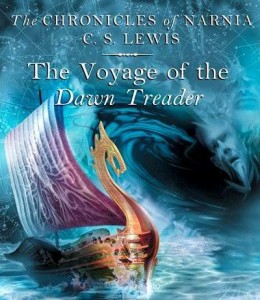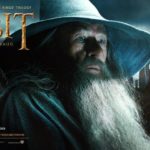It’s Dawn
 OK, it’s actually late afternoon here, but it is time for me to write my review of The Voyage of the Dawn Treader, so I used a little chronometric license 😉 .
OK, it’s actually late afternoon here, but it is time for me to write my review of The Voyage of the Dawn Treader, so I used a little chronometric license 😉 .
I went to see the latest version—I say latest because I understand some years ago the BBC produced a movie-length rendition of the third book in C. S. Lewis’s Narnia series—a week ago and have had time to mull over what I want to say.
First, in my list of 2010 favorites, I have to bump Dawn Treader from the number two spot in movies to number three. In its place I’m putting Tangled.
Now on to the actual review.
As a story. The friend I saw Dawn Treader with loved the movie. She, who had not read the book, thought it was the best of the three Narnia movies.
I thought it had suspense building to a climax, a touching ending, believable character development, adventure. I did not find the antagonist to be a sufficient foe, especially since the protagonists had no goal. Yes, Prince Caspian had a goal, but Edmund and Lucy didn’t have a specific goal. That weakened the story, I think.
As a movie adaptation. The boy who played Eustace Scrubbs was brilliant, and Reepicheep was every bit the hit he was in the book. I truly enjoyed both characters.
As so many others have said, I was left baffled as to why some of the scenes in the book were compressed and truncated, when developing them to their fullest would have made the movie much more interesting. The dangers of each island were barely revealed before they were solved. More please! was my response at every turn.
Also, I couldn’t help wondering why there weren’t more Narnians on board the Dawn Treader. It seemed to be mostly a group of men and a couple talking animals. No dwarfs. Perhaps I’m wrong to expect a more eclectic crew. I’ll have to pull out my copy of the book and see.
As a Christian work. Clearly the movie is not a Christian work, nor should viewers have expected it to be so. C. S. Lewis wrote fantasy, and we Christians recognized the truth he incorporated in his stories. Sadly, those coming to the books from a different worldview will miss some, if not all, of the parts that point to Christ. And that includes those who made the movie. True to form, they veered from the heart of Narnia in a variety of places. But they maintained what I consider to be the most crucial elements—Eustace’s change from dragon to boy and Aslan’s explanation that the children must learn to know him in their world by his other name. Those were well done and not downplayed at all.
Rant alert: Even if the movie makers had been faithful to the story, viewers should watch with a critical eye and measure the story with the Bible, not C. S. Lewis’s book. We Christians are too quick to give our stamp of approval to something that carries the “right” brand. Is it Christian? All right then, we can watch that movie, read that book, and put our powers of discernment away.
I find that to be a position setting a person up to believe false teaching.
I’ll use The Shack as an example. While many people loved the book because it gave them a greater understanding of God’s love and forgiveness, they may not have realized that it also exposed them to Paul Young’s ideas about universal salvation. Why? Because they let their guards down since they’d been told the book was a Christian work.
Labels, good or bad, should not do our thinking for us. We need to read and evaluate each work on its own, using the Bible as the standard by which we measure the truth it contains.
Conclusion. See The Voyage of the Dawn Treader. Then see it again. More importantly, buy the book, read it aloud to someone you love, give it away and buy it again. Talk about the story. Compare it to what the Bible says about us and about God. And finally, cheer on the movie makers so that they will make the next one. These fantasies need to be out in our culture. They need to be stories Christians and non-Christians alike know and talk about. (And pray that the movie-makers get the next one right! 😀 )








































Ok, I have not seen this movie yet ($ and kids lol), but I liked your review, especially your ending when even if something is labeled “Christian” we should still bring discernment along. I’m starting to come across Christian fiction where sin is okay if it helps the greater good (or moves the plot along), with no consequences or a slight slap on the hand. I’m all for characters struggling, but when a Christian author says sin is okay for the greater good, that’s sending a mixed message to the readers.
Great example of the kind of thing we should be watching for, Morgan. Sadly, it seems the majority of readers are too quick to accept, or reject, a book and all it says based on the author’s name or the particular brand (oh, it’s Christian romance. Then it’s fine!). I think we take in a lot of subtle influence when we assume all is well if the book comes from X Christian store or is written by Y Christian author.
Becky
[…] This post was mentioned on Twitter by Speculative Faith, Timothy Stone. Timothy Stone said: http://tinyurl.com/2dcy784 – SpecFaith: It’s Dawn […]
“I’ll use The Shack as an example. While many people loved the book because it gave them a greater understanding of God’s love and forgiveness, they may not have realized that it also exposed them to Paul Young’s ideas about universal salvation. Why? Because they let their guards down since they’d been told the book was a Christian work.”
Never liked The Shack. I thought it was billed as nonfiction, not fiction? Didn’t read it. Don’t want to. I like the point you made in this book. We do tend to brand it via labels and not put up to the truth of the Bible.
I saw the film today. Your review is spot on, and the most crucial part of that review is this “But they maintained what I consider to be the most crucial elements—Eustace’s change from dragon to boy and Aslan’s explanation that the children must learn to know him in their world by his other name. Those were well done and not downplayed at all.” There were things that could have made the movie better, and many of them were also things that would have made it more like the book.
Thanks.